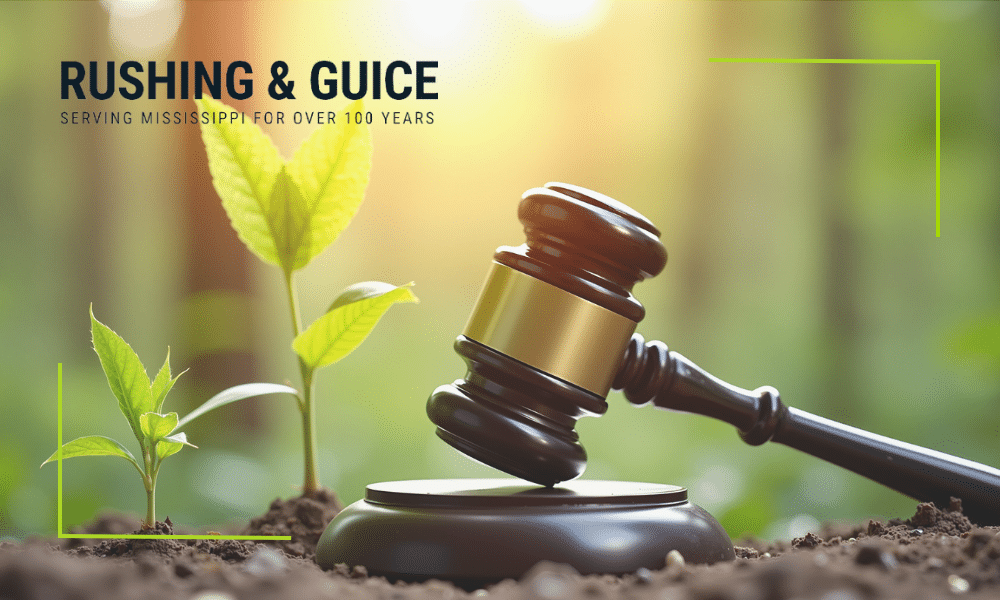
Representing Businesses in Complex Environmental Litigation Cases Serving Ocean Springs, Mississippi
Environmental law has been around for a long time, but just recently has become something to be aware of or worry about. With climate change and many companies breaking environmental laws, the economic and socio-political impact of these laws requires an intricate matrix that must be continuously evolving.
At Rushing & Guice, PLLC, our Ocean Springs Environmental Lawyers have decades of experience assisting public and private clients with state and federal environmental cases. When it comes to the environment, our environmental litigation lawyers are here for you.
We can help set up the internal procedures and guide expansion when necessary so that your company will comply with all laws concerning waste management or wildlife protection – not just those on a spreadsheet.
What does a Mississippi environmental lawyers do??
The experience and input of environmental lawyers in Mississippi, especially along the Gulf Coast, is crucial in designing, supporting, and auditing compliance systems for businesses, municipalities, and private individuals. They work to encourage sound rulemaking at the federal and state levels and guide clients through regulatory ambiguities, particularly during enforcement proceedings. These attorneys are often involved in matters related to land use, water rights, pollution control, coastal management, and environmental impact assessments.
They also represent clients in litigation involving property contamination, natural resource damage, and violations of environmental laws. Whether you need to navigate complex EPA regulations, secure permits for coastal development, or defend against government actions, environmental lawyers ensure your rights and interests are protected while promoting sustainable practices along Mississippi’s Gulf Coast.
The environmental law business is booming. Tons of litigation happens at both the civil and criminal levels, with enforcement proceedings conducted through either administrative adjudication or court action.
Superfund (also known as CERCLA) gives EPA the funds and authority to clean up contaminated sites when there is no viable responsible party. Superfund designations are a major source of litigation in the United States: they provide an opportunity for individuals and companies who believe they have been negatively impacted by environmental contamination. Environmental litigation includes toxic torts, natural resources, water rights disputes, brownfields, endangered species challenges, climate change, and groundwater contamination.
Types of Environmental Litigation Cases We Represent
We have represented buyers and sellers of real estate, landlords and tenants, lenders and borrowers, and real estate development firms faced with a broad range of environmental issues, including:
- Air pollution and Clean Air Act matters
- Asbestos issues
- Clean Water Act issues
- Comprehensive Environmental Response, Compensation and Liability Act (CERCLA)
- Contract negotiations and indemnifications
- Defense of environmental lawsuits and environmental crimes
- Environmental hazard mitigation and clean up
- Fiduciary liability protection
- Groundwater contamination
- Hazardous materials and waste
- Land use
- Lender liability protection
- Permitting issues
- Private citizens’ lawsuits
- Real estate development issues
- Soil contamination
- Wastewater management
- Wetlands regulation, mitigation, and restoration
With the help of experienced counsel, environmental law compliance can be integrated into your business’s commercial activity with a minimum of cost and effort.

Federal Environmental Laws
In the 1970s, three major environmental laws were passed by Congress: the Clean Air Act, the Clean Water Act, and the Toxic Substances Control Act. Since then, these laws have been amended and, in some instances, extended by administrative regulations. Essentially, these laws have identified types of environmentally harmful activities; imposed specific conditions and standards on that activity; and prohibited some forms of activity that adversely affect the quality of air, water, land, and wildlife. Accurate recordkeeping is an important aspect of doing business that conforms to the requirements of these federal laws. Specific processes are required in anticipation of any activity that has an impact on the environment through construction, development, agriculture, and commercial activity. Our lawyers know how to help our clients conform to the mandates of environmental law and incorporate these measures seamlessly into their operations.
Mississippi Environmental Laws
Mississippi businesses and governmental entities are also regulated by the Mississippi Department of Environmental Quality. Businesses using, manufacturing, treating, transporting, or releasing toxic chemicals, more than 650 of which have been identified by the Mississippi Department of Environmental Quality, must report the locations and quantities of chemicals stored on-site. The reports are submitted to the Environmental Protection Administration and to the State of Mississippi. To improve enforcement and containment, the EPA compiles this data in an online publication, a publicly accessible national computerized database. Mississippi’s Department of Environmental Quality, along with the EPA, is serious in its enforcement of these laws to protect the residents of Mississippi and the nation. In 2021, over $59.5 million in penalties were imposed for environmental violations within Mississippi.
Compliance with Environmental Laws
Environmental law remains in flux with a need for evolving business methods secured by sound legal judgment to fully understand how these laws impact business operations in Mississippi. Permitting, compliance, recycling, e-waste, and pollution prevention are all necessary aspects of doing business in Mississippi. We can help make them an integral part of our client’s business plans.
These environmental laws do work. A recent study by Louisiana State University examined the impact of the Clean Water and Clean Air Acts on the quality of the Mississippi River, especially downstream. Midwestern farming had gravely threatened the water and wildlife in the Mississippi River as fertilizers and other nutrients bled into the river during spring rains. Human and animal waste was also contaminating the ground and water.
However, in the sixty years since these federal laws were enacted, the bacteria, lead, and sulfate content in the river has vastly decreased while beneficial oxygen and Ph have risen. The bacteria content of the river is 1% of what it was in the 1980s. This improvement is mostly derived from the increase in sewage treatment plants along the waterway.
Although runoff from agriculture and urban streets still remains a hazard to the quality of water in the Mississippi River, toxic chemicals from factories and plants have been greatly curtailed. These are signs of a healthier Mississippi River.
Environmental Protection for Wetlands, Rivers, and Streams
Wetlands are vital to the health of our environment and water resources. They provide many benefits, including filtering pollutants from water, recharging groundwater supplies, and providing habitat for fish and wildlife. Unfortunately, wetlands are often abused and degraded by illegal dumping and runoff from construction sites, farms, and other land uses.
Dumping trash, chemicals, or other pollutants into wetlands is not only illegal, it’s harmful to the environment. These substances can contaminate the water and soil, and harm or kill plants and animals.
Runoff from construction sites, farms, and other land uses can also damage wetlands. When rain falls on these areas, it picks up sediment, nutrients, and other pollutants. This runoff can then flow into wetlands, where it can smother plant life, change the water chemistry, and damage habitat.
You can help protect wetlands by learning about the laws that protect them and reporting any illegal activity you see. By working together, we can ensure that these important ecosystems are preserved for future generations.
The Clean Water Act
The Clean Water Act (CWA) is the primary federal law in the United States governing water pollution. The CWA was passed in 1972 to restore and maintain the chemical, physical, and biological integrity of our nation’s waters. The CWA prohibits the discharge of pollutants into navigable waters unless a permit is obtained.
Wetlands are protected under the CWA through the National Pollutant Discharge Elimination System (NPDES) permit program. The NPDES permit program requires anyone discharging pollutants into navigable waters to obtain a permit. This permit sets limits on the amount of pollution that can be discharged and requires the discharge to meet certain water quality standards.
The CWA also requires the development of Total Maximum Daily Loads (TMDLs) for waters that are impaired by pollution. A TMDL is a calculation of the maximum amount of a pollutant that a waterbody can receive and still meet water quality standards. TMDLs are designed to restore and protect water quality in impaired waters.
State and local governments also have laws to protect wetlands. These laws may be more stringent than the CWA, so it’s important to check with your state or local government to see what regulations apply in your area.
You can help protect wetlands by learning about the laws that protect them and reporting any illegal activity you see. By working together, we can ensure that these important ecosystems are preserved for future generations.
Defending Against Environmental Violations
Both federal and state agencies have the enforcement authority to prosecute violations of environmental laws. The best defenses against these claims are adequate, particularized insurance policies, and knowledgeable environmental defense lawyers.
Any business that manufactures products or provides services that might be subject to environmental regulations at the federal or state level could be open to an environmental claim. Business property owners might be responsible for environmental cleanup and restoration even for pollution that occurred before purchase of their current property. Experienced counsel at Rushing & Guice can guide our clients through transactions to minimize their exposure to environmental claims.
Properly insuring a business requires research and consideration of the risks of doing business. General business liability insurance policies often contain limitations on environmental defense. Therefore, it is necessary to consider other forms of insurance, depending on the particular business and environmental risk:
- Pollution Legal Liability (PLL) Insurance – Coverage for cleanup or protection against claims relating to pollution events at a site.
- Cost Cap Insurance – Protection against cost overruns in contamination cleanup projects.
- Contractor’s Pollution Liability Insurance – Coverage for pollution liability associated with contractor’s operations.
- Errors and Omissions Insurance – Protection for environmental consultants and other service providers.
- Underground Storage Tank (UST) Policies – Protection against unforeseen cleanup and costs relating to USTs.
The second line of defense against environmental claims is competent and experienced counsel who knows how to navigate the maze of environmental laws and administrative regulations. That’s what we do at Rushing & Guice.
Contact Rushing & Guice, PLLC Today
At Rushing & Guice, our experienced environmental law attorneys stand ready to provide knowledgeable and trusted counsel on all matters that implicate the laws and regulations governing land use and environmental preservation and reclamation.
Call us at (228) 374-2313 or fill out our online form to arrange for a limited initial consultation. We look forward to hearing from you and look forward to the opportunity to serve as your attorneys.







